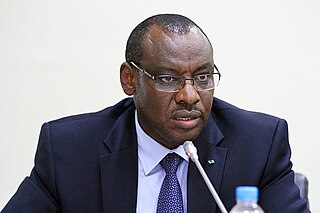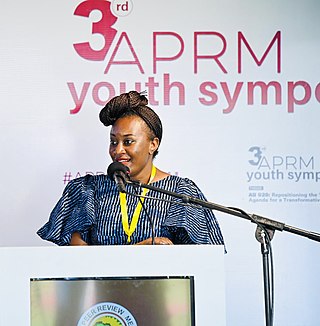
The New Partnership for Africa's Development (NEPAD) is an economic development program of the African Union (AU). NEPAD was adopted by the AU at the 37th session of the Assembly of Heads of State and Government in July 2001 in Lusaka, Zambia. NEPAD aims to provide an overarching vision and policy framework for accelerating economic co-operation and integration among African countries.

Yvette Ngwevilo Rekangalt is a Gabonese businesswoman, bankruptcy lawyer for the court of Libreville, and human rights leader. She worked for 25 years as a jurist in the oil and gas industry. She has been a member of the African Union's Economic, Social and Cultural Council representing Central Africa for three terms, as well as chairperson of the Infrastructure and Energy Committee. She ran for office during the 2009 Gabonese election before vanishing from the political scene after the results. She is still very active in business and social activities.

The New Partnership for Africa's Development E-School Program is included as a means to provide ICT equipment such as computers and internet access to all schools in member nations within The New Partnership for Africa's Development (NEPAD) program. NEPAD parents the E-School Program and is an economic program that aims to bring economic and social development to African nations and ensure 'Africa's Renewal'. The E-School Program began with Demonstration Projects and has developed further yet remains a work in progress in many countries, facing both criticism and support.

The African Union Commission (AUC) acts as the executive/administrative branch or secretariat of the African Union. It consists of a number of Commissioners dealing with different areas of policy. The African Union Headquarters are in Addis Ababa, Ethiopia. It should be distinguished from the African Commission on Human and Peoples' Rights,, which is a separate body that reports to the African Union.

The African Peer Review Mechanism (APRM) is a mutually agreed instrument voluntarily acceded to by the member states of the African Union (AU) as a self-monitoring mechanism. It was founded in 2003.

The African Development Bank Group is a multilateral development finance institution, headquartered in Abidjan, Ivory Coast since September 2014. The AfDB is a financial provider to African governments and private companies investing in the regional member countries (RMC).

The Infrastructure Consortium for Africa (ICA) was launched at the 2005 G8 Gleneagles Summit, with the mission to help improve the lives and economic well-being of African people by supporting and promoting increased infrastructure investment from both public and private sources.

The Development Bank of Southern Africa (DBSA) is a development finance institution wholly owned by the Government of South Africa. The bank intends to "accelerate sustainable socio-economic development in the Southern African Development Community (SADC) by driving financial and non-financial investments in the social and economic infrastructure sectors".

The African Union (AU) is a continental union of 55 member states located on the continent of Africa. The bloc was founded on 26 May 2001 in Addis Ababa, Ethiopia and launched on 9 July 2002 in Durban, South Africa. The intention of the AU was to replace the Organization of African Unity (OAU), established on 25 May 1963 in Addis Ababa by 32 signatory governments; the OAU was disbanded on 9 July 2002. The most important decisions of the AU are made by the Assembly of the African Union, a semi-annual meeting of the heads of state and government of its member states.
The Panel of the Wise (PoW) is a consultative body of the African Union, composed of five appointed members who each serve three year terms. Its mandate is to provide opinions to the Peace and Security Council on issues relevant to conflict prevention, management, and resolution. Representatives are chosen for the North, East, South, West, and Central regions of the continent.

Abdiweli Mohamed Ali Gaas, also more known as Abdiweli Gaas, is a Somali American economist and politician. He served as the Prime Minister of Somalia from June 2011 to October 2012, and briefly afterwards as an MP in the newly formed Federal Parliament. During his time as premier, Ali is credited with having devised the formal "Roadmap for the End of Transition", a political process that provided clear benchmarks leading toward the establishment of permanent democratic institutions in the country. On 8 January 2014, he was elected the 5th President of the Puntland.

The Independent Electoral and Boundaries Commission (IEBC) is an independent regulatory agency that was founded in the year 2011 through the making of the Constitution of Kenya. The Commission is responsible for conducting or supervising referendums and elections to any elective body or office established by the Constitution, and any other elections as prescribed by an Act of Parliament. It was created in a provision of the 2010 constitution and the Independent Electoral and Boundaries Commission Act. Its mandate includes "the continuous registration of voters and revision of the voter's roll, the delimitation of constituencies and wards, the regulation of political parties process, the settlement of electoral disputes, the registration of candidates for elections, voter education, the facilitation of the observation, monitoring and evaluation of elections, the regulation of money spent by a candidate or party in respect of any election, the development of a code of conduct for candidates and parties, [and] the monitoring of compliance with legislation on nomination of candidates by parties."

Claver Gatete is a Rwandan politician and diplomat who has been serving as the Executive Secretary of the United Nations Economic Commission for Africa since 2023.
Made In Africa Foundation is an organisation established in 2011 to assist development of the African continent by providing first-stage funding for feasibility studies and business development of large-scale infrastructure projects based in the region.
The African Governance Architecture (AGA) is a mechanism for dialogue between stakeholders that are mandated to promote good governance and bolster democracy in Africa. In the book entitled The African Union Law (Ed. Berger Levrault, 2014, p. 29) Blaise Tchikaya established the link between conceptual platform called AGA and the modernisation of International Law applicable to African states. The AGA is fundamentally one aspect – probably the most significant – of recent international law of governance. Furthermore, it is a key actor in promoting the domestication and implementation of the objectives outlined in the legal and policy pronouncements in the African Union (AU) Shared Values. Established in 2011 AGA is based in Addis Ababa, Ethiopia in the AU Headquarters with the AGA Platform Members based Africa wide. In February 2016 the rules of Procedure on how the AGA legally functions were adopted by Member States during the African Union Summit.
Water-related industry in Africa provides jobs and employment opportunities in many sectors, for example agriculture, fisheries, manufacturing and industry.

The 2018 Kenya handshake was a political truce made on 9 March 2018 between Kenyan President Uhuru Kenyatta and former Kenyan Prime Minister Raila Odinga. The two had been the leaders of opposing political factions amidst widespread political violence and civil unrest; they had previously faced one another in the contested 2017 Kenyan general election. Under the agreement, their political feud with an agreement that Kenyatta would support Odinga in the upcoming presidential elections. Consequently, the Azimio coalition was formed, Uhuru became its chairman, and Odinga became the presidential candidate with Martha Karua as his running mate. They lost to William Ruto, who was then Kenyatta's deputy. They challenged Ruto's victory in the Supreme Court, but Chief Justice Martha Koome said his claims did not meet the evidentiary threshold and dismissed the case. At a March 2023 protest in Nairobi they demanded an audit of the IEBC election servers.
The Comité Maghrébin de l'Electricité (COMELEC), also Maghreb Electricity Committee and North African Power Pool, is an association of five North African countries belonging to the Arab Maghreb Union. The major aim of the association is to interconnect the electricity grids of the member countries in order to facilitate the trading of electric power between the members. North African Power Pool is one of the five regional power pools in Africa.

Chido Cleopatra Mpemba currently serves as the Special Envoy for Youth at the African Union Commission (AUC). She was appointed as the second African Union Youth Envoy by the chairperson of the African Union Commission Moussa Faki in November 2021, as the youngest senior official in the history of the African Union and youngest diplomat in the chairperson's cabinet. Chido took over from Aya Chebbi from Tunisia. According to the Chairperson of the African Union Commission, Moussa Faki, the role of the AU Youth Envoy is to assist in championing youth development issues in Africa.
An African Union (AU) Commission Chairperson election will be held in February 2025 to choose the fifth Commission Chair to succeed incumbent Chairperson Moussa Faki.











